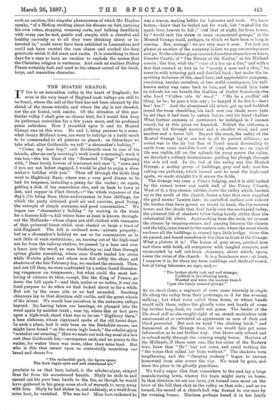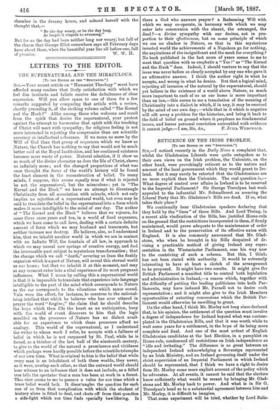THE MOATED GRANGE.
IT lies in an nntrodden valley in the heart of England ; for even in the very heart of England such valleys are still to be found, where the call of the bird has not been silenced by the shriek of the steam-whistle, and where the sky is not clouded, nor the air fouled, with smoke. Of the situation of this par- ticular valley I shall give no clearer hint, for I would fain keep its pathways untrodden for a few years more, and its profound peace unbroken. How I stumbled upon it and its Moated Grange was on this wise. He and I, being parsons in a some- what dreary Midland town, are wont to indulge in a habit much to be commended to all parsons so placed ; on Saturdays we take what, after Goldsmith, we call " a shoemaker's holiday."
"Come, my dear boy," said Goldsmith once to one of his friends, after an early morning's work (such a morning's work it
was too,—the ten lines of the "Deserted " beginning with, " Dear lovely bowers of innocence and ease "), " come,and if you are not better engaged, I would be glad to enjoy a shoe- maker's holiday with you." 'Then off through the fields they went to Highbnry Barn, where was a very good dinner to be had for tenpence, including a penny for the waiter ; on again, getting a dish of tea somewhere else, and so back to town at last, and supper in Fleet Street,—" the whole expenses of the day's fete being from three-and-sixpence to four shillings, for which the party obtained good air and exercise, good living, the example of simple manners, and good conversation." We began our " shoemaker's holiday " by making in the train for a famous hill—a hill whose fame at least is known through- out the Midlands—whose slopes are still clothed with remnants of that primeval forest which once shaded so large a tract of mid-England. The hill is enclosed now,—private property ; but on a shoemaker's holiday we are so far communists as to reck little of such restrictions ; so, turning out of the high-road not far from the railway-station, we passed by a lane and over a fence into the wood, no man hindering us, and then through sylvan glades ascending, where once Garth tended his swine while Wamba gibed, and where now fell softly the shine and shadows of the fair February day, we reached the summit. Then, and not till then, we were confronted by a notice-board threaten- ing vengeance on trespassers ; but what could the moat law- loving of citizens do then, except, like the King of France, go down the bill again ?—and that, notice or no notice, it was our fixed purpose to do when we had looked about us for a while. Bat not by the same side as we had ascended. Smoking chimneys lay in that direction still visible, and the great wheels of the mines. We would lose ourselves in the unknown valleys beyond. So, having taken our bearings, we plunged into the wood again by another track ; near by, where this at last gave upon a high-road, stood what was to be our " Highbury Barn," a lone alehouse, whose signboard spoke of the old forest days. In such a place, had it only been on the Berkshire moors, one might have found " on the warm ingle bench," the scholar-gipsy "seated at our entering." Here we made our mid-day meal at a lees cost than Goldsmith hie,—sevenpence each, and no penny to the waiter, for waiter there was none, other than mine host. But who is this that enters upon us contentedly munching our bread and cheese P- " The outlandish garb, the figure spare,
The dark vague eyes and soft abstracted air,"
proclaim to ns that here, indeed, is the scholar-gipsy, strayed thus far from his accustomed haunts. Shyly he stole in and spread out his poor lean bands to the fire, as though he would have gathered in his grasp some stock of warmth to carry away with him. Shyly he had stolen in, and suddenly, at a word from mine host, he vanished. Who was he P. Mine host reckoned he
was a tramp, making belike for Leicester and work. We knew better,—knew that he looked not for work, but "waited for the spark from heaven to fall ;" and that at night, far from towns, he "would seek the straw in some sequestered grange," in the Moated Grange itself, perhaps, to which we have been so long in coming. But, courage ! we are very near it now. Yet just one glance at another of the company before we pay our sevenpences and go. To the scholar-gipsy succeeded another character we k new, Granfer Cantle, of "The Return of the Native," or his Midland cousin ; like him, with the " voice of a bee up a flne," and with a face that seemed at first to be " merely a nose and a chin," ho came in with tottering gait and doubled back ; but under the in- spiriting influence of fire, small-beer, and appreciative company, consisting, besides ourselves, of two stolid countrymen, his well- known merry way came back to him, and he would fain tars to ridicule for our benefit the frailties of Gaffer Somebody-else who lived " t'other side th' wood." "He be a croffiin' old thing, he be; he goes a this way ; be Banged if he don't,—hee I bee! hee!" And the abandoned old mimic got up and hobbled round the room chuckling, his back now one shade more bent by art than it had been by nature before, and his tread shakier. What further excesses of merriment he indulged in I cannot record, for at this point we departed. Behind the alehouse, a pathway led through another and a smaller wood, and over another and a lower hill. Beyond the wood, the valley of the= MoatedGrange lay at our feet in all its perfect stillness ; no sound was in the air but that of liquid music descending to earth from some invisible fount of song above us ; no sign of life was visible, till on the uplands far away across the valley, we descried a solitary husbandman guiding his plough through the rich red soil. In the bed of the valley was the Heated Grange, a motley group of buildings, grey and red ; and for. saking our pathway, which turned now to meet the high-road again, we made straight for it across the fields.
The Grange was once a Prior's lodging, and it is still backed by the ruined tower and south wall of the Priory Church:.
West of it, a tiny stream babbles down the valley which, banked. up to the north of the church, forms a lake that once supplied the good monks' Lenten fare: its unruffled surface now reflects the bushes that have grown up round its bank, the ivy-covered. tower, and the clouds that float lazily over the enchanted valley,
the pictured life of shadows below being hardly stiller than the substantial life above. Approaching from the west, we crossed- the stream by stepping-stones, and passing between the church and the lake, came round to the eastern side, where the moat which, encloses all the buildings is crossed by a little bridge. Over this. we passed, and found ourselves in the close in front of the Grange. What a picture it is ! The house of grey stone, patched here and there with brick, all overgrown with tangled creepers, and surmounted by tall red-brick chimneys, above which, again, tower the ruins of the church. It is a farmhouse now ; at least, I suppose it is, for there are farm buildings and shedsall round, but of living labourers no sign, and,-
" The broken sheds look sad and strange, Uplifted is the disking latch,
Weeded and worn the ancient thatch Upon the lonely moated grange."
As we stood there, a regiment of cows came leisurely in single file along the valley from their pasturage, as if for the evening milking ; but what voice called them home, or whose hands would milk them, unless the ghostly voice and hands of some lay brother long dead, we could not guess. The leader of the file stood still as she caught eight of ns, struck motionless with amazement at so unwonted an appearance as men of flesh and blood presented. But now we tried "the clinking latch," and hammered at the Grange door, for we would fain get some information as to our further way. Our blows only echoed and re-echoed sadly through the seeming empty house. Mariana of the Midlands, if there were one, like her sister of the Eastern- fens, knew that "He" had not come, and cared nothing for "the voices that called her from without." The shadows were lengthening, and the "clanging rookery" began to stream homeward from afar across the sky. We mast be gone, and leave the place to its ghostly guardians.
We had a vague idea that somewhere to the east lay a large manufacturing town, whence the train might carry us home. In that-direction we set our faces, yet turned once more on the brow of the hill that shut in the valley on that side ; and as we turned, the sound of...a church-bell was floated to our ears by the evening breeze.. Mariana perhaps heard. it in her. lonely chamber in the dreamy house, and solaced herself with the thought that,-
" Be the day weary, or be the day long, At length it ringeth to evensong."
But for us the day had been neither long nor weary: but full of the charm that George Eliot somewhere says all February days have about them, when the beautiful year lies all before one, full















































 Previous page
Previous page